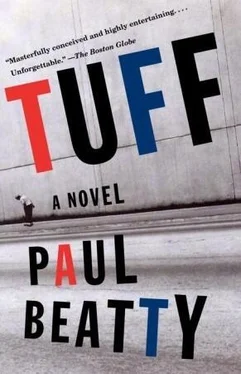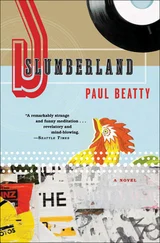The last weepy notes of “Parsley, Sage, Rosemary and Thyme” were losing out to the uptown din. “Make a right here,” ordered Winston. Spencer wheeled the car onto East 102nd Street. To his surprise the block was quiet. Rows of renovated brownstones and thin churches lined both sides of the street. The end of the block was dark, sealed off by the trestle for the Metro North train, which once past Ninety-sixth Street runs aboveground along Park Avenue. Branches of an overgrown oak diffused the streetlight, breaking it up into rays of imitation moonbeams. At the corner, on the right-hand side, barely visible through the oak in its front yard, was a decaying silt-brown building that loomed over the rest of the block like a haunted house. “Stop at the corner.” Winston got out of the car and vanished around the corner, entering the building through a side entrance.
Spencer couldn’t decide what tape to play next; it was between Bread’s greatest hits and Harry Chapin’s. A commuter train rumbled slowly past, the slogging clack of the cars almost lending an aura of rusticity to the setting. Harry Chapin’s gritty warble clattered out into the darkness, buckled itself to the tracks, and took out after the departed Metro North train like a noisy caboose.
When Winston finally emerged from the building, his eyes were bloodshot and an indelible smile creased his face. In his hands was a shoe-box full of marijuana and explosives. “Sorry about that, Money, but you know how it is when you doing business.” Winston held up what appeared to be a small stick of dynamite and examined it in the amber streetlight. “Besides, I ain’t been in that spot since I was twelve years old. Much memories up in there, boy.”
“What is all that?”
“Weed, nigger.”
“I mean the other stuff.”
“Ain’t nothing. Some M-80’s and cherry bombs, two half-sticks, but mostly smoke bombs.”
“Smoke bombs?”
“Yeah, I know some niggers who thinking about deprivatizing a bank, and supposedly the smoke bombs will fog up the surveillance camera.”
“Winston, I’m going to have to insist that you never get in my car again with the intention of doing something illegal. If I find out that I’m taking you to or picking you up from some dope deal or something, then the Big Brother thing is over.”
“Chill out. Don’t get all self-righteous on me, when you just pick me up from playing three-card monte to meet with Bruce of the New Procession Party — but that served your purpose, so it was all right, I guess?”
“Progressive Party.”
“Whatever. Man, I would never put you in no situation. Nigger, you’d be in my way.”
Spencer started the ignition and asked his passenger to shut the door. Winston didn’t budge. “Just pull out, getaway-style,” he said. Gunning the engine, Spencer hit the gas and threw the car into gear, the momentum slamming the door shut just as the car rounded the corner onto Park Avenue.
The Mustang idled in front of Winston’s building, neither man moving until Harry Chapin’s son had grown up just like him. “You still want me to come over tomorrow and help you prepare for the debate?”
“Yeah, do that. But Yolanda got finals, so we have to do it outside.”
“We’ll walk around the neighborhood or something.”
“Cool. One thing though, Rabbi — don’t wear those shoes you got on.”
“These? The clogs?”
“Yeah, nigger, the clogs. Don’t wear them. If you think I’m going to be clippity-clopping merrily up the ave with your ass, you crazy. How much them things hit you for anyway?”
“One hundred and forty dollars.”
“What? And they sweat us for buying sneakers that cost that much! It’s the spending habits of you bougie niggers they need to address. A bill and a half for some wooden blocks! Shit, I’ll cut up a two-by-four in two pieces, glue on some socks, and sell them to you for fifty bucks, yo.” The belly rolls of laughter eventually rocked Tuffy out of the car. He stuck his head back in and offered his hand. Spencer hesitated, not sure if Tuffy was proffering the traditional or the soul shake. They shook quick and firm like dignitaries departing for their respective helicopters. “That’s the diff between a nigger like me and a nigger like you,” said Winston, backing out of the window. “One forty for some clogs or some tennies.”
“White people can’t tell the difference, though.”
“True indeed.”
“But it really hurts when other black folk can’t tell the difference. I expect the white people to clutch their purses, and cross the street.”
“Yeah, back in the day if I saw you coming, Rabbi, I’d cross the street too, but I’d be coming over to your side to take your money.”
“Thanks a lot.”
“Well, Rabbi, at least you sound white. You got that going for you. You spend the rest of your life on the phone, your shit be straight hunky-dory. But I got one for you, though. What’s the difference between white people and black folks?”
“Is that a riddle?”
“No, I’m serious.”
“White people eat ice cream year-round, even in the winter. And when they give you a ride home, they drop you off, then drive away as soon as you get out of the car. Black folks wait until you’re safely inside.”
“Thanks for the lift, Rabbi.”
“Easy, Winston.”
“All right then.”
The boys standing in the vestibule parted like canal locks; Winston floated through, and they closed ranks behind him. Spencer waited a minute or two, then drove off with a tire squeal, closing the passenger door getaway-style.
20- INFIERNO — DEBAJO DE NUEVA ADMINISTRACIÓN
The butt end of a flauta de pollo disappeared down Winston’s gullet. His napkin already saturated with grease stains, he licked his fingertips and wiped his mouth with the corner of the linen tablecloth. “I don’t know where all these Mexicans came from, but I’m glad they decided to move here. Fucking food is good.” Spencer paid the bill and they left Puebla Mexico, Winston savoring the last of his cold horchata.
Headed north, they walked in silence, digesting the meal and their surroundings. Like the moors of the English countryside or the bogs of the Louisiana bayou in a late-night creature feature, at night the streets of East Harlem undergo a metamorphosis. Only fools and monsters trod in the darkness. Spencer splashed up Lexington Avenue, jumping at every hoot-owl screech. Winston slipped upstream, an urban alligator skimming the swamp’s surface, eyes peeled for prey.
At 110th Street locals jammed the intersection. Oblivious to the automobile traffic, they dashed between cars, yelling and furiously signaling to one another like traders on the New York Stock Exchange floor, closing bell be damned. “It’s hot out here tonight!” Winston remarked with a relish that made it obvious he was referring more to the street frenzy than to the muggy evening. Spencer read the lettering above the gated windows of the post office on the far side of 110th Street, ‘HELL S GATE STA ION.’ At their feet were a couple sitting on milk crates and dressed in T-shirts, cut-off denims, and foam-rubber thongs, watching a black-and-white television powered by an extension cord alligator-clipped to the innards of a lamppost. The Yankee game was in extra innings, and the play-by-play in melodramatic Spanish. The woman, her newly hot-combed hair dipping like an aileron behind her head, looked away from a pop-up and greeted Winston with a broad smile. “Hey, Tuffy Tuff.”
“What up, girl? How you feel?”
When her man saw Winston, he grabbed and held his dog, a stocky black-and-brown rottweiler named Murder, by the collar. “ ¿Qué te pasa , bro?”
Читать дальше












